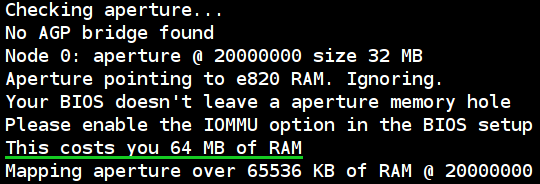30th September 2009
If you have happened to observe similar messages in your dmesg:

[ 0.004000] Checking aperture…
[ 0.004000] No AGP bridge found
[ 0.004000] Node 0: aperture @ 20000000 size 32 MB
[ 0.004000] Aperture pointing to e820 RAM. Ignoring.
[ 0.004000] Your BIOS doesn’t leave a aperture memory hole
[ 0.004000] Please enable the IOMMU option in the BIOS setup
[ 0.004000] This costs you 64 MB of RAM
[ 0.004000] Mapping aperture over 65536 KB of RAM @ 20000000
and you are using AMD-based system w/o AGP video, then my advice is: just leave that as is, do not bother “improving”! Any tinkering with kernel boot options won’t do you any good, as the kernel has already done the best it could.
Just a note: all those messages at the top of the post should only happen if you have 4 or more GiBs of RAM. If you have less than that, and do have those messages – my experience might be inappropriate for your case.
Another note: my BIOS does not have any IOMMU settings (or “Memory hole remapping†settings), so I didn’t try that. You should check if your BIOS has IOMMU-related options first, just as kernel message suggests.
Read on for details.
Read the rest of this entry »
Posted in *nix, how-to | No Comments »
8th June 2009
Found here.
Recursively set directories only to drwx-rx-rx (755):
find . -type d -exec chmod 755 {} \;
Recursively set files only to rwx-r-r (644):
find . -type f -exec chmod 644 {} \;
Recursively remove carriage returns (^M) from the end of all *.php files:
find . -type f -name “*.php” -exec /home/user/dos2unix.sh {} \;
In all these cases, {} is replaced with the filename/directory find has found matching your parameters; \; at the end just stops exec processing.
Posted in *nix, how-to, Links, Notepad | No Comments »
7th May 2009
MC is a console file manager. It supports FTP connections, and in my experience is faster in FTP than both Krusader and Gnome Commander.
However, the default FTP connection format string [username[:password]@]hostname has a drawback of not allowing the use of usernames with ‘@’-symbol in them – which is very common for virtual hostings.
One of the solutions is (done in your home directory):
- if there is no .netrc file in your home directory — touch .netrc && chmod 600 .netrc
- mcedit .netrc (or use vi, nano, or any other editor you prefer)
- add the following line to the file (replace all-caps words with your actual credentials): machine HOSTNAME login USER@HOSTNAME password PASSWORD
Now, start MC, choose FTP connect, and enter only the hostname. You will be automatically logged in to the remote FTP.
This will also work for console ftp clients like lftp.
Posted in *nix, how-to | 1 Comment »
16th April 2009
Connecting remotely via ssh to my Debian box at work, I needed to mount a CIFS (samba) share, but didn’t remember server name (or IP) and share name.
At least two convenient utilities are available in Debian Lenny for non-X Samba browsing.
smbtree (part of smbclient package) will list all visible workgroups, their servers, and share names of those servers – including “hidden” shares like C$, IPC$, ADMIN$, print$. Very handy and greppable!
samba-commander (smbc package) is a ncurses samba browser with “find file” functionality.
Posted in *nix, Software | No Comments »
30th March 2009
Imagine you have some styles.css transferred from Win machine to Linux via FTP in binary mode instead of ASCII mode; then
cat styles.css | tr -d "\r" > styles-nocarriage.css
will create styles-nocarriage.css with ^M’s removed.
Alternative syntax:
tr -d "\r" < styles.css > styles-nocarriage.css
Most editors have global replace features which allow to get rid of control characters using regular expressions (exact instructions are editor-specific).
For multiple files, try this:
for f
do
mv $f ${f}~ && tr -d "\r" <${f}~ >$f
rm ${f}~
done
Save this shell script as a file (e.g. dos2unix.sh), then do ./dos2unix.sh . This script accepts wildcards (e.g. ./dos2unix.sh *.php), so be careful!
Posted in *nix, how-to, Notepad | 3 Comments »
26th February 2009
(…)
it is a very useful tool for performing installations if you’ve got something like a LiveCD which supports your hardware.
(…)
Installing new Debian systems with debootstrap, and also as a debootstrap PDF (with comments).
Posted in *nix, Links | No Comments »
5th January 2009
Unix SEX :{ look; gawk; find; sed; talk; grep; touch; finger; find; flex; unzip; head; tail; mount; workbone; fsck; yes; gasp; fsck; more; yes; yes; eject; umount; makeclean; zip; split; done; exit:xargs!!;)} (source: someone’s signature in the Debian mailing lists).
download Unix/Linux command reference by Jacob Peddicord/FOSSwire.com
Posted in *nix, Humour, Notepad | No Comments »

